#013. Caffè Sospeso
What do we say about communal kindness? A nicety that spreads across the town, so vast that one can just slip into it and become a god.
Humans have expressed kindness in various ways that some of such events have become unflinching part of history.
In context, Joseph Blankson, a Nigerian contractor, was in a boat somewhere in Rivers State in 2018. The boat capsized, and as a swimmer, instead of swimming to safety alone, he saved 13 people from the river. But as he was trying to save the 14th person, he became exhausted of the going in and out of water, and tragically drowned.

Another one that often comes to my mind is of a Spanish runner, Ivan Fernandez Anaya, and a Kenyan runner, Abel Mutai during a cross-country race in Spain in 2012. As Abel who was leading the race approached the finishing line, he thought he has completed the race and slowed down. Ivan who was second in line realized Abel misunderstood the situation, so instead of taking advantage of that, he gestured Abel to finish the race and cross the line, while Ivan came second.
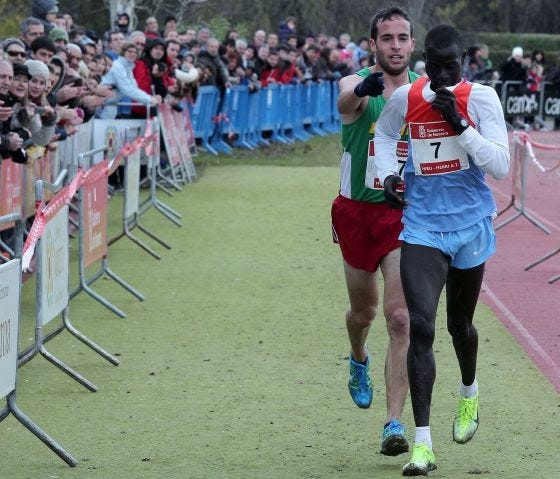
These are individual acts of kindness, borne out of selflessness and sportsmanship.
But what do we say about communal kindness? A nicety that spreads across the town, so vast that one can just slip into it and become a god.
One of such is the caffè sospeso—a strange but unique act of altruism.
Without much ado, caffè sospeso simply means "suspended coffee." Some loosely translates it as "pending coffee" or "pre-paid coffee" or "pay-it-forward coffee."
Originated from Naples, Italy, it is a situation where someone buys two cups of coffee but receive only one, leaving the second coffee "suspended" for someone else to enjoy later.
The idea is that anyone who cannot afford a coffee can enter the starbuck and ask the barista if there are any sospeso available, and if so, they can enjoy a warm beverage for free.
It started as an idea born during World War II in Naples at Gran Caffè Gambrinus in 1860, and became a tradition that spreads across the working-class cafés of Naples.
Post-war, many men in Naples who had lost their fortunes couldn't afford even a basic necessity like coffee, which was seen not as a luxury but a right. Those who could still afford it began the habit of paying for two coffees: one for themselves and one for whoever needed it next. The recipient remained anonymous, maintaining the dignity of both giver and receiver.
Sometimes, it is done as a form of showing gratitude, when someone had experienced a good luck, he would order a sospeso in generosity.
Luciano De Crescenzo says:
“When someone is happy in Naples, instead of paying a cup of coffee for himself, he just pays another one for someone else; it’s like offering a cup of coffee to the rest of the world.”
The sospeso receipt is often dropped in container of any kind, such as the ones above and below, to track the purchase or available suspended coffee.
Later recognized as a tradition of expressing solidarity and helping those struggling to afford even a simple coffee, it was practiced in other parts of Italy and even internationally, extending widely its Neapolitan roots.
Continuing or 'modern day' practice?
Although almost getting obsolete and waned during the economic prosperity following World War II, it was revived later through resurgence from its source and gradual global adoption.
In 2010, on the occasion of Gambrinus’ 150th anniversary, a bar in Italy situated next to Piazza Plebiscito, the caffè sospeso network was initiated. With this initiative, one can pay for a coffee for anyone around the world who can claim it.
The tradition saw a resurgence in Italy in 2011 with small festivals creating a Suspended Coffee Network as a show of solidarity amidst cultural funding cuts.
In December 2011, Naples declared an annual "Suspended Coffee Day" or "Caffè Sospeso Day" every December 10.
Research revealed that this idea has been adopted by cafes in numerous countries including Bulgaria, Ukraine, Australia, Canada, Romania, Russia, Spain, Argentina, the United States, and Costa Rica.
According to an account, over 150 cafés in Bulgaria, inspired by the "caffè sospeso" concept, have participated in this goodwill initiative.
A Starbucks in Newington, Connecticut, saw almost 1,500 customers participating in a "pay it forward" chain during Christmas 2013, where patrons paid for the orders of those behind them.
Aurelio De Laurentiis, chairman of the S.S.C. Napoli football club, is known to sponsor ten sospesi after every victory.
In March 2013, John Sweeney launched a Facebook page for "Suspended Coffees," leading to the sale of over 15 million coffees across 34 countries by 2015.
In April 2013, Starbucks' UK division joined a charitable program based on this concept, matching the price of each suspended coffee with a donation to the Oasis charity.
On July 22, 2013, in Edmonton, Canada, an anonymous patron prepaid for 500 large coffees at Tim Hortons, sparking a movement that spread to 30 locations, resulting in over 10,000 cups being donated.
In 2017, Neapolitan writer, Luciano De Crescenzo published a collection of his journalistic essays from 1977 to 2007, titled "Il caffè sospeso: Saggezza quotidiana in piccoli sorsi," meaning "suspended coffee: daily wisdom in small sips", a singular act which helped popularize the tradition across Italy.
On September 10, 2021, an anonymous customer in Istanbul, Turkey, made a record donation by purchasing 501 Turkish coffees at Dönerci Metin Usta, marking the largest such gesture in a century.
It is therefore wise to conclude that there are modern day caffè sospeso practice in recent times.
A Documentary
In 2013, BBC documented a cafè sospeso-supporting starbucks in London.
Coffee7 is a starbuck based out in Forest Gate, east London, and supports the "Suspended Coffee" initiative.
Somewhere in the cafè is this "support" logo indicating their support for the initiative.
Also, at their entrance, they have this chalkboard, asking visitors or customers to either donate a sospeso or benefit from it.
They also have a board behind them which shows in tally how much cafe sospeso has been donated, how much has been taken and how many is available at a point in time.
Beneficiaries walk in and make the request. “They don't have to "prove" anything to claim one, but the scheme relies on the good faith of everyone involved," said the manager.
I grew up having a similar experience, but
it is seasonal, because it happens during the Muslims obligatory fasting in the month of Ramadan.
29 or 30 days, based on the lunar appearance of the moon, we wake to eat before Fajr for Sahur (the food eaten at that time), and after Fajr we stop eating up till evening period when we break the fast, called Iftar.
Iftar comes before Maghrib prayer in the evening so it is often done at the mosque.
In most mosques, people bring Iftar for others to take from.
While some bring fruits, some will provide food to be eaten after the Maghrib prayer. They are often placed somewhere in the mosque so interested faster will just go there to take.
During our juvenile delinquencies, my brothers will go from mosque to mosque to take Iftar before retiring home for our homemade food.
This 2025 Ramadan, I still took sliced watermelon a number of times for Iftar at the mosque, including palm dates and, for once, a plate of jollof rice, and another time, àkàrà.
Sospeso diversified?
Expanding beyond cafés, some businesses have adopted the idea and offer "suspended" meals or drinks as well.
I think fast food joints and grocery stores can adopt this by offering suspended items like bread or snacks.
Doesn't it feel good that you can just walk into a cafeteria, feeling weary and without means, and ask for a coffee (or food), if one is available, to sate your thirst or hunger?In fact, you could just be the giver, purchasing three cups or meals, keeping one for yourself, and suspending two for others.
Caffè sospeso invites you to join its journey of change, one cup at a time.
It should not be limited to coffee—you could donate a hot soup, a hearty sandwich, fruit, or an entire meal.
In fact, imagine 'suspended books' at bookshops 😊
The "caffè sospeso" tradition has also popularized the 'suspended baskets' idea, where less affluent residents would hang baskets outside their homes, hoping that generous passersby might leave food donations for them.
The suspended concept should thus be versatile and diversified, as it obviously replicates easily with other items.
Moreso, it has been used to respond to the 2008 recession as well as the hardship caused by covid-19 in 2020.
The culture isn't to just meet a momentary need but also potentially restoring dignity. It reminds us that no matter how isolated one might feel, there's always someone somewhere who cares. Though it begins with a cup of coffee, it's about so much more.
In the end . . .
Cafè sospeso believes everyone deserves recognition and care.
It reinforces the idea of community and social responsibility, reminding us to look out for each other.
This simple act of kindness can make a big difference in someone's day, especially during difficult times.
Hey!
May I have a "suspended coffee" there? 😉
Oh! To properly put it:
C’è un caffè sospeso'?
'Is there a suspended coffee?'
Did you enjoy reading this?
Drop me some words in the comment.
Info and some image sources: Wikipedia, BBC, Snopes, Italy Segreta, Eataly, Lavazza, Fables & Focaccia

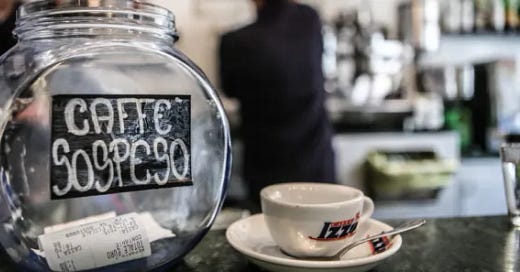



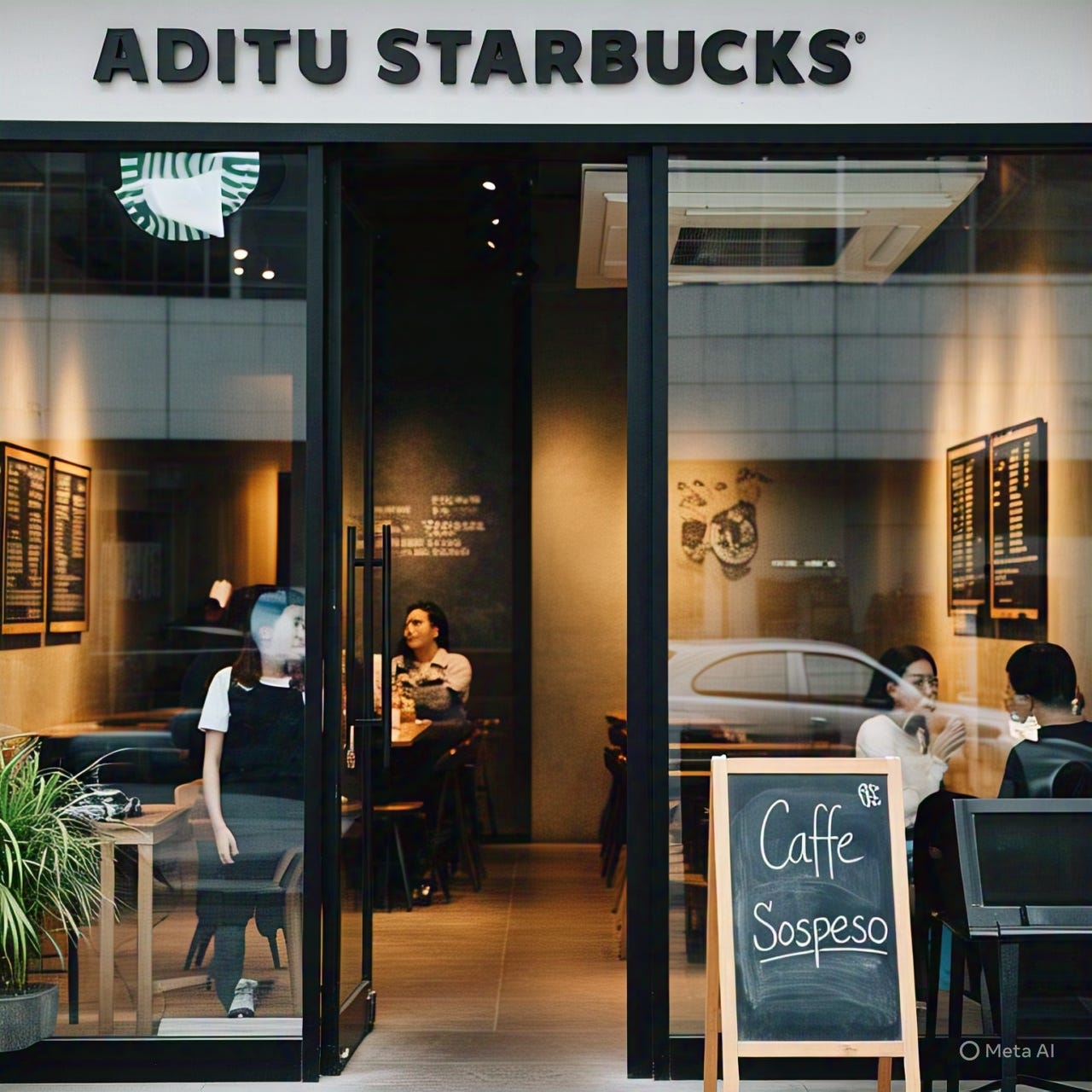
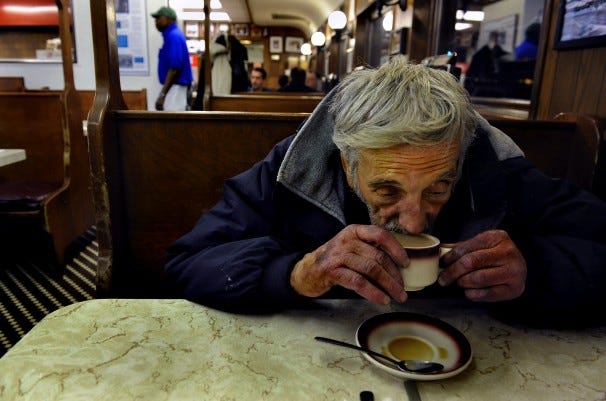
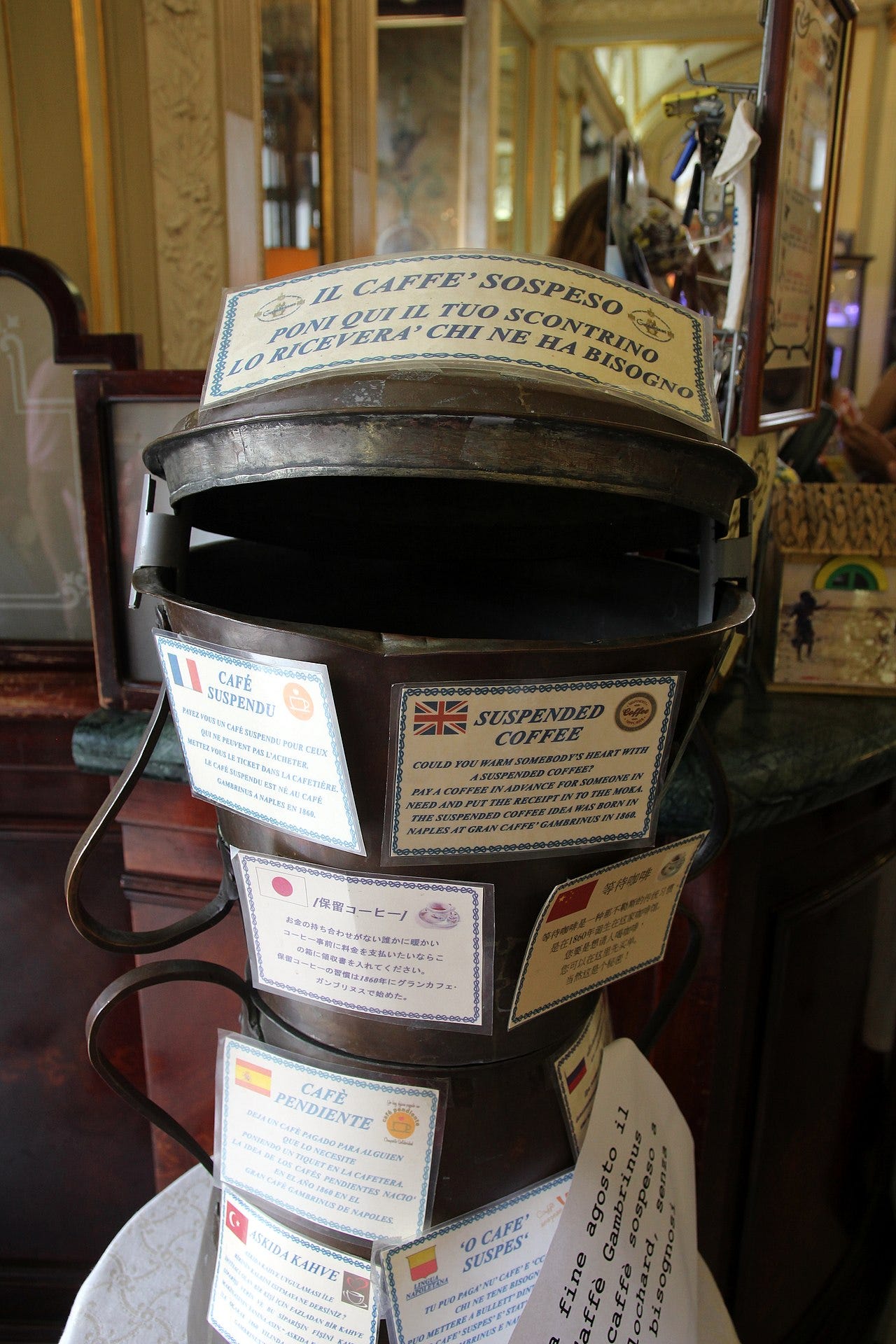
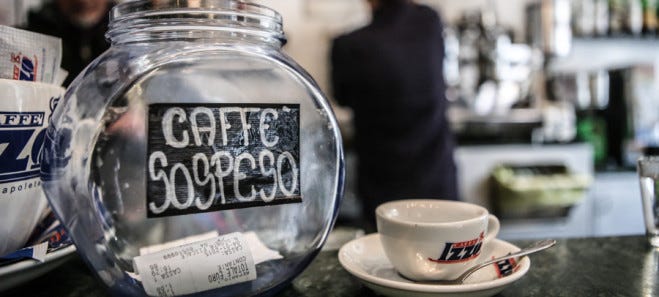
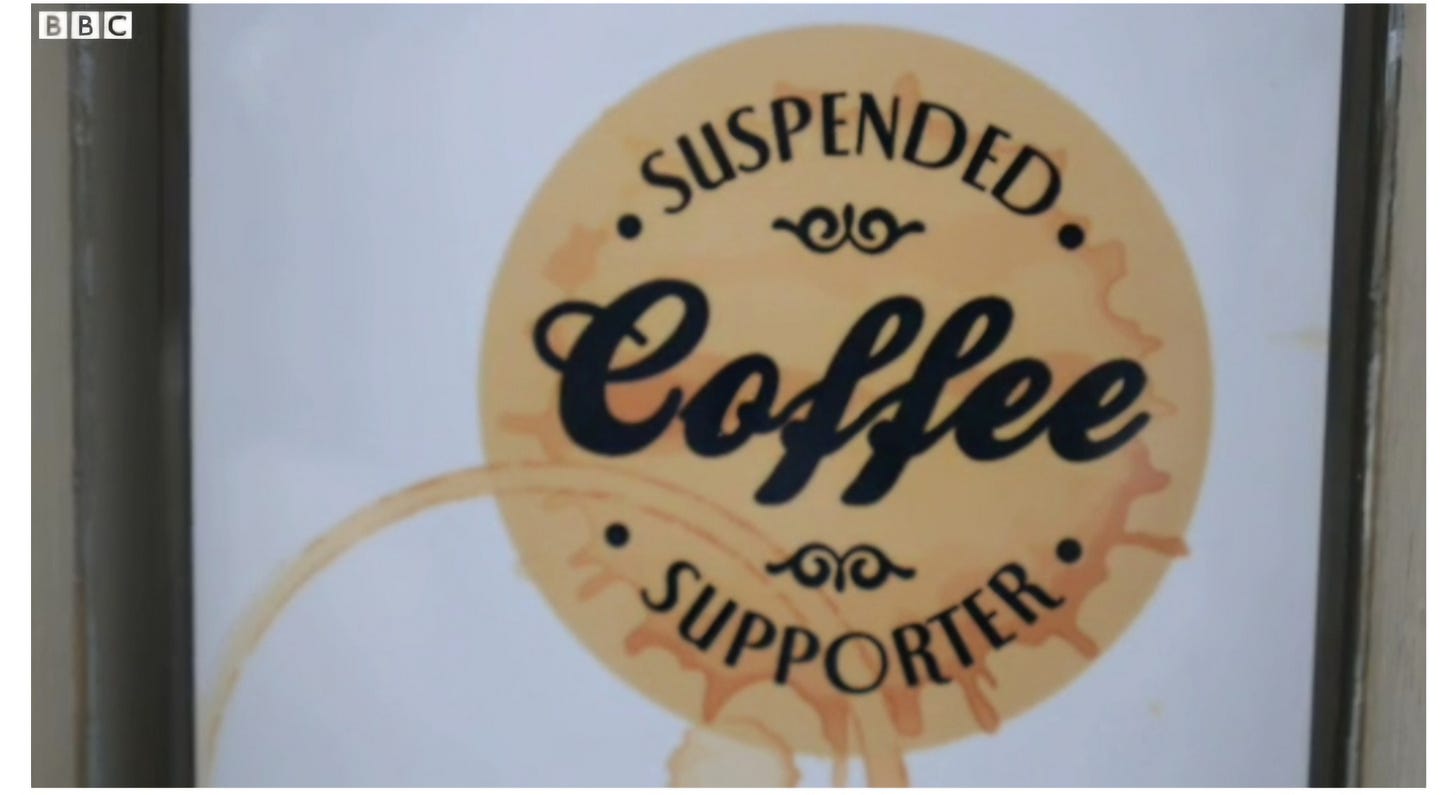
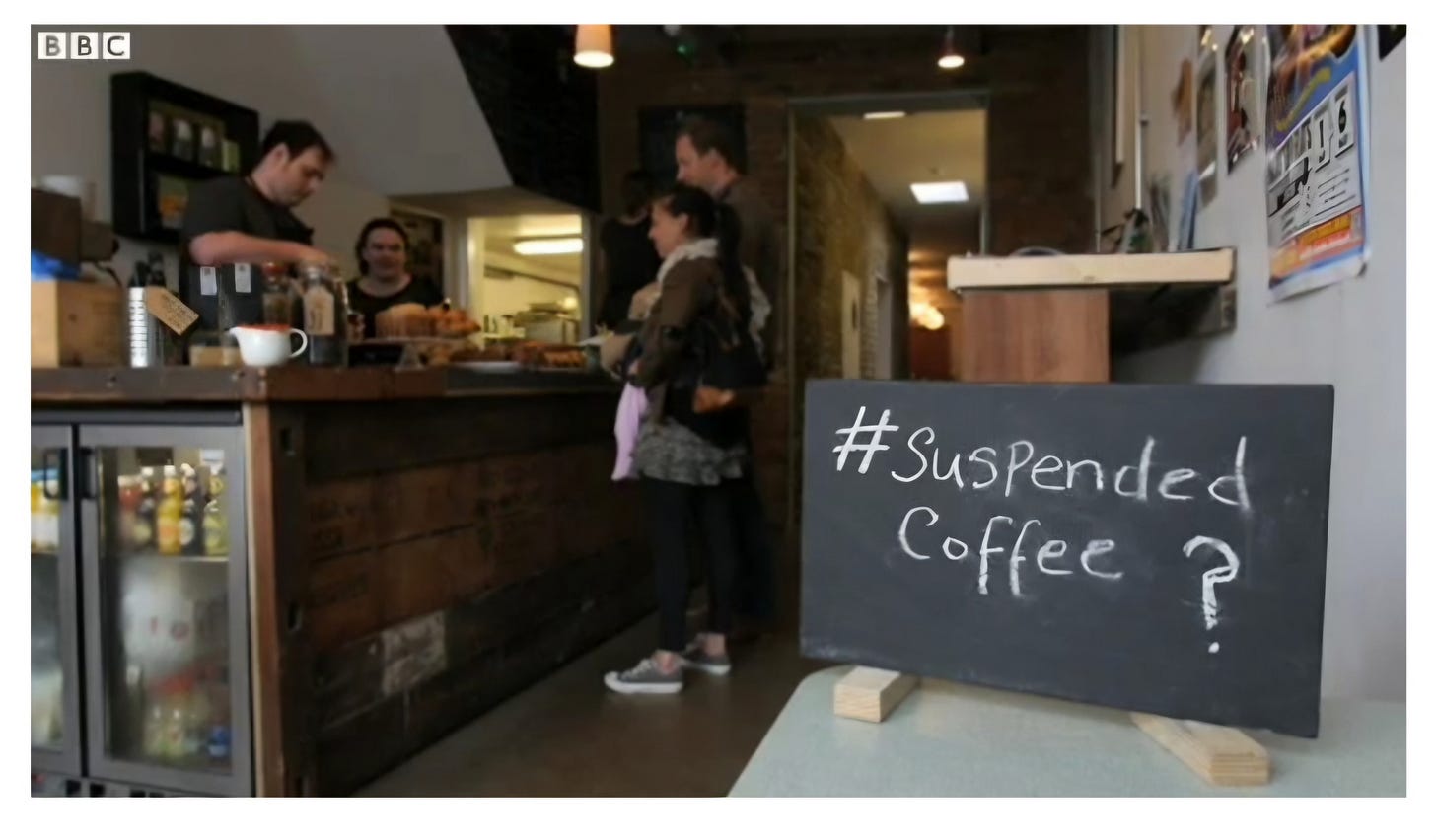

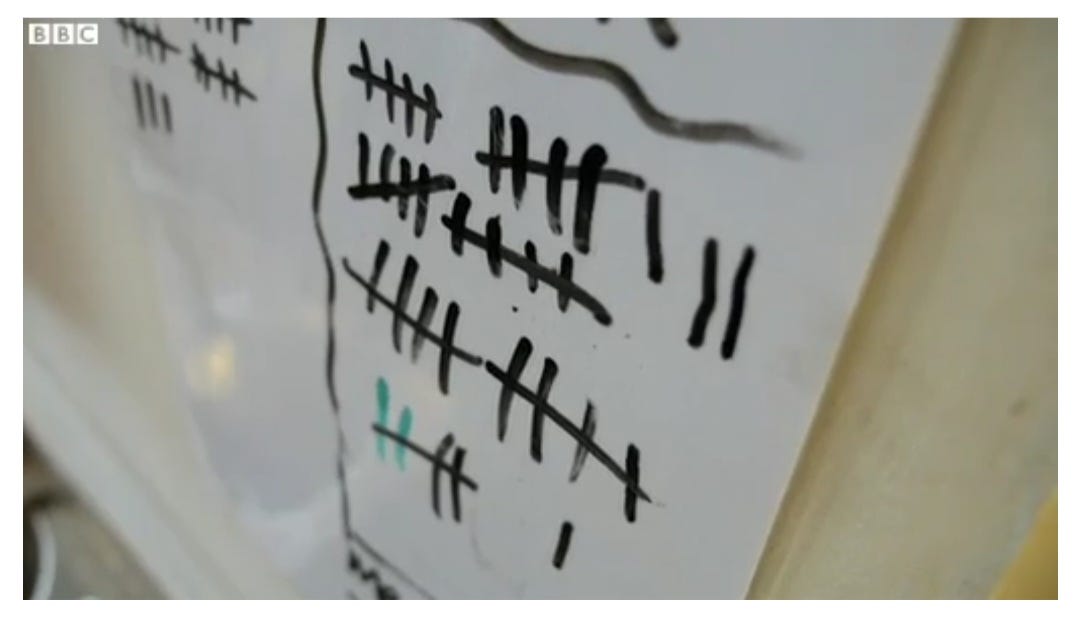
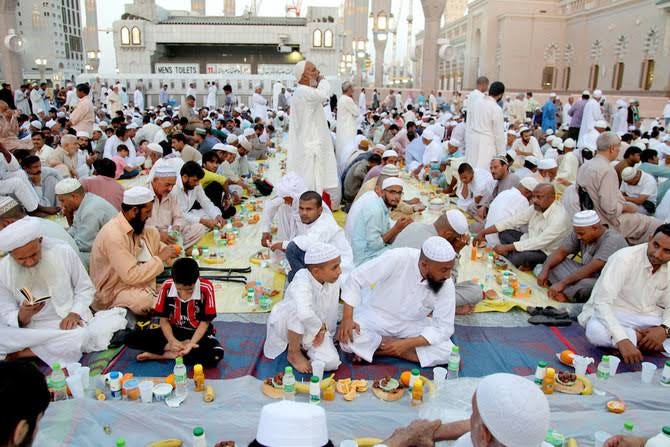
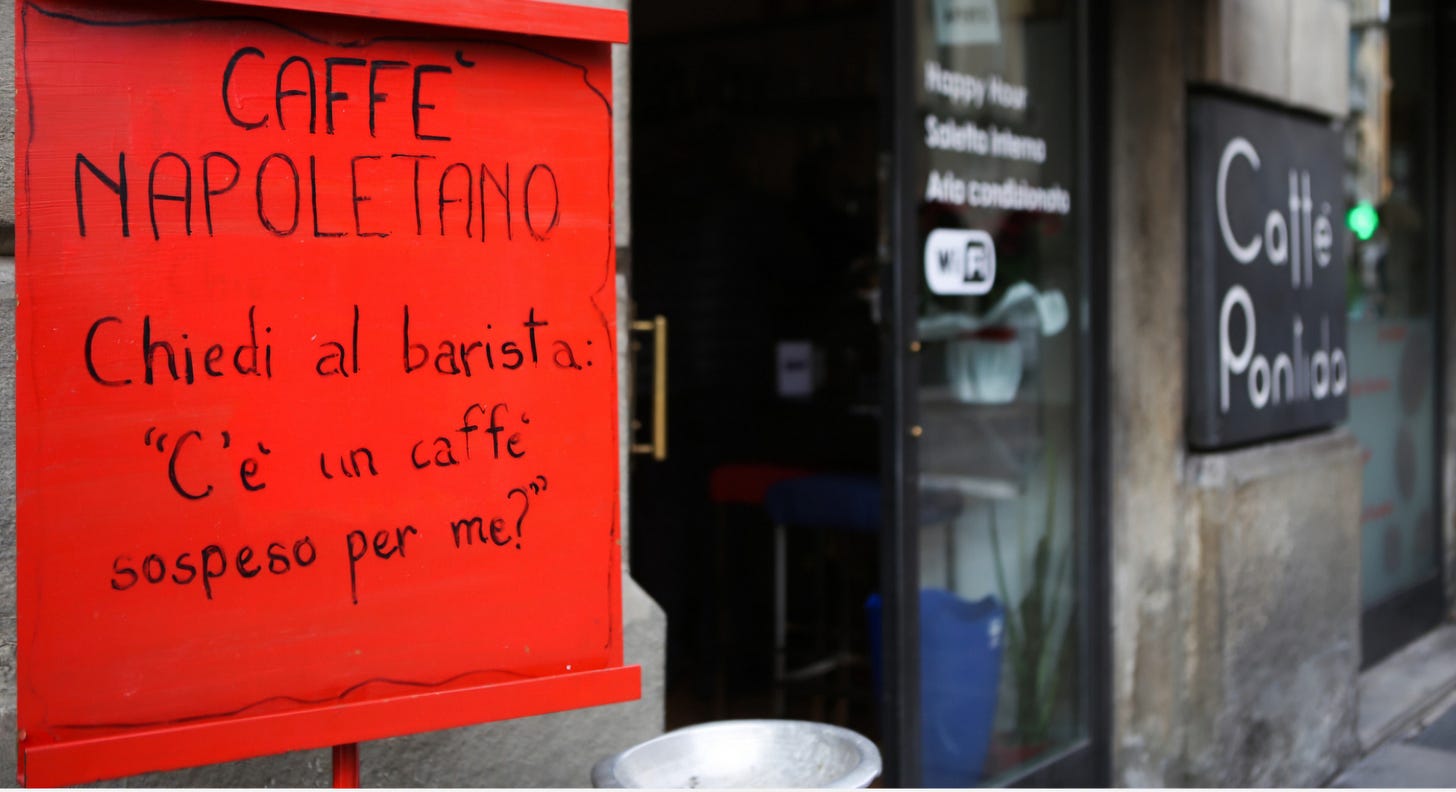
Such a fantastic write-up.
'caffe sospeso' is a good initiative to consider. Beyond Ramadan period, we can all extend a little act of kindness to someone in need. The fast food restaurants and groceries shops are a good place to start.
Like always, I enjoyed your newsletter. Kundus to your writing process.
This is beautiful. And the way you eased the reader into the main story...I enjoyed every bit of this.
Kindness is a theme I enjoy exploring.